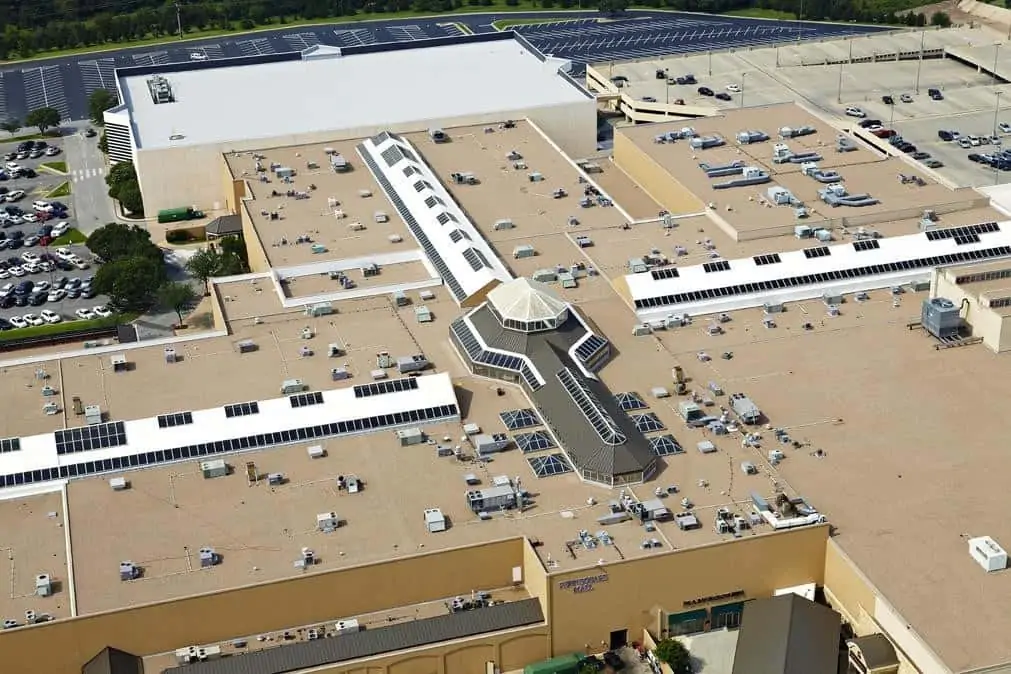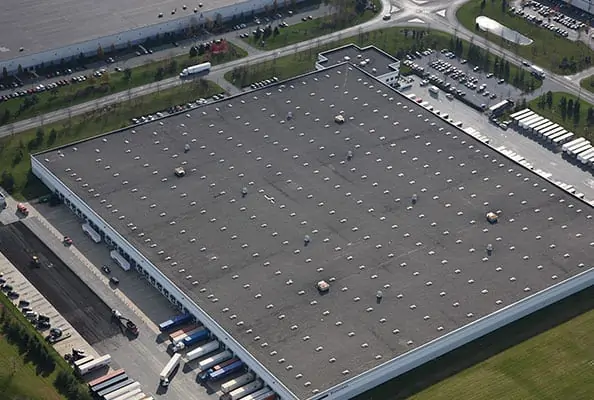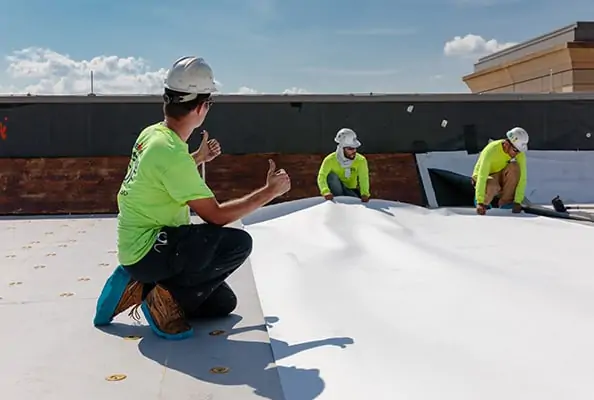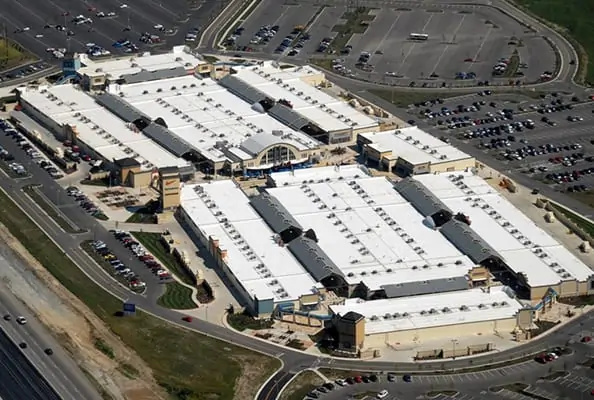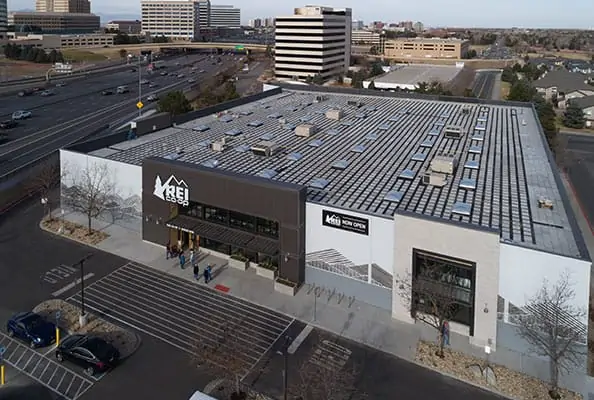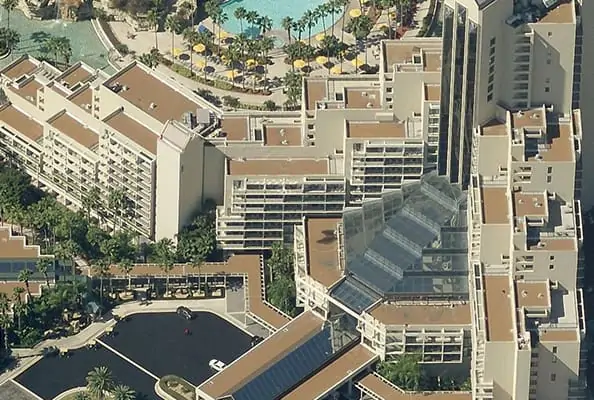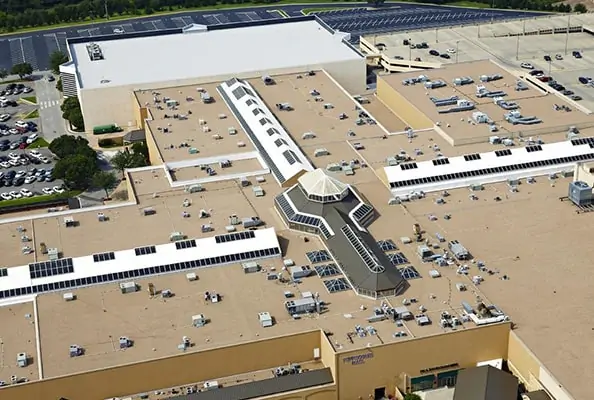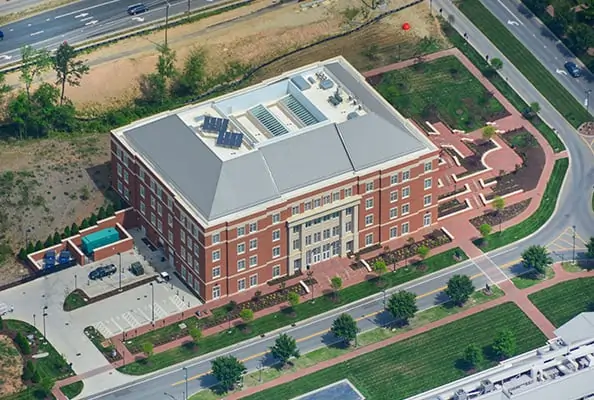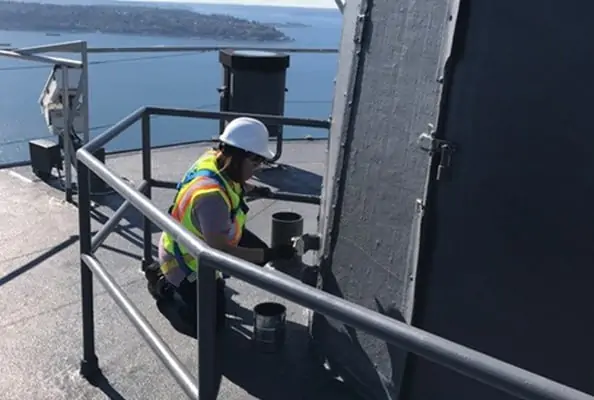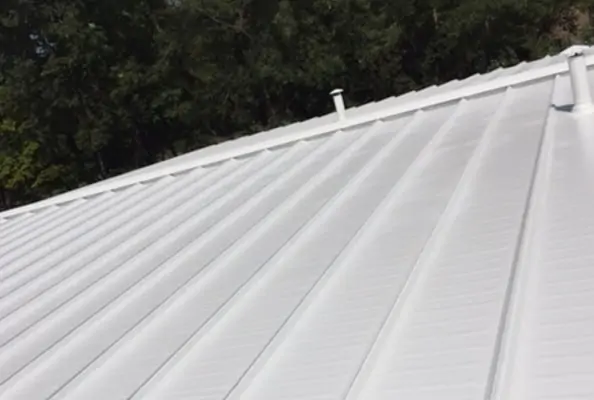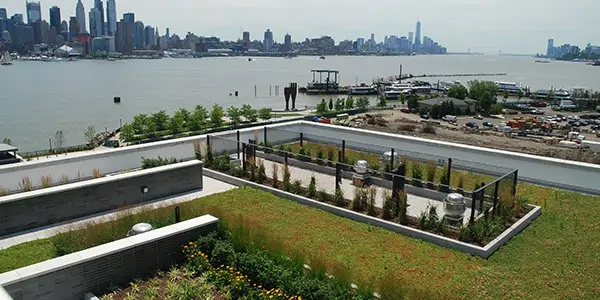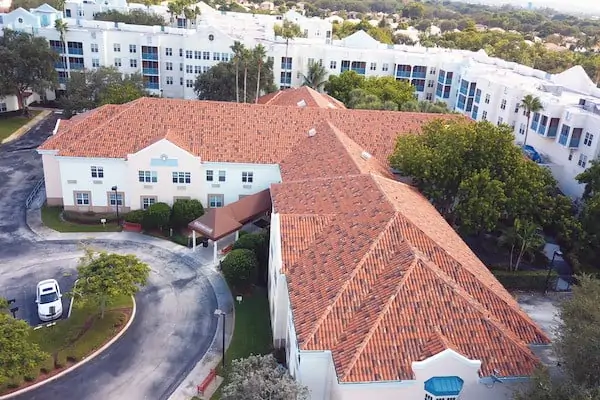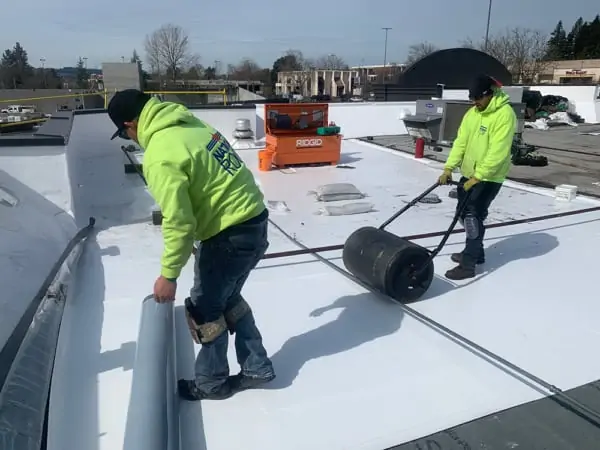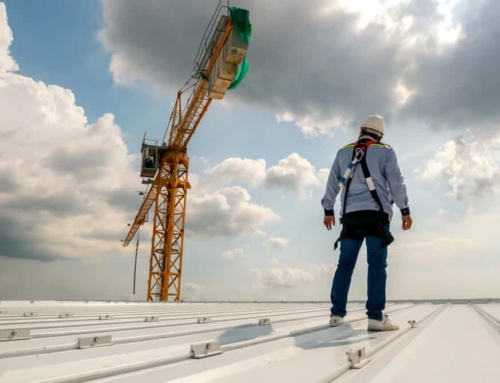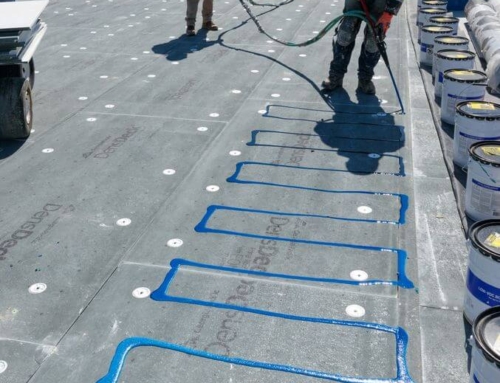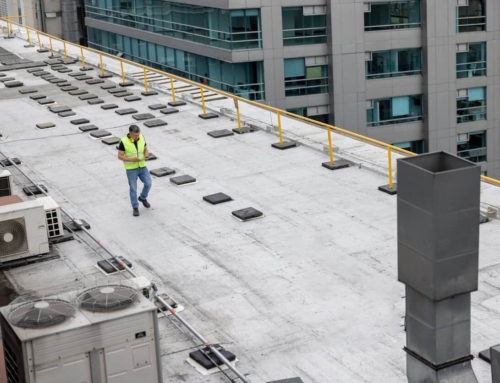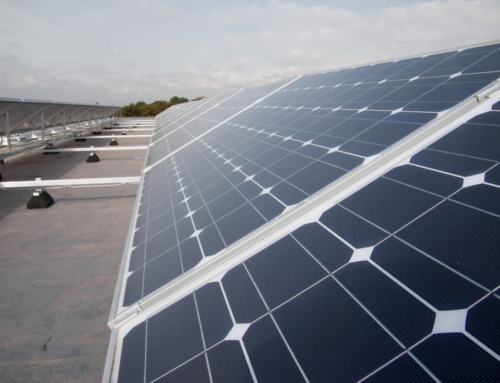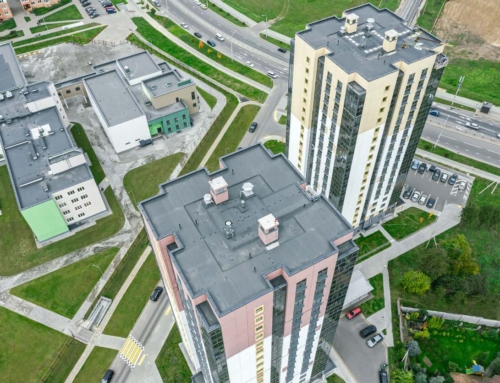While commercial roofing systems and residential roofs share the same primary function of protecting your property or residence from the elements, that’s where the similarities end. The most significant difference between commercial roofing systems and residential roofing is the slope of the roof which is determined by the size of the building.
Because residences are smaller, they typically have a steep slope roof that is visible from the ground and uses materials such as architectural tile, asphalt shingles, and slate. Given the larger size of commercial buildings, commercial roofs tend to have flat or only slightly sloped roofs which are not visible from the ground.
Commercial roofs come in a wide range of materials which are determined by the structure of the building and other factors like climatic conditions, e.g., intense heat, extreme cold, or if a surface needs to withstand high foot traffic.
Contents
- 1 Commercial Roofing Materials and Modern Technology
- 2 Choosing a Commercial Roofing System
- 3 Shape of Commercial Roofs
- 4 Types of Commercial Roofing Systems
- 4.1 Single Ply Roofing
- 4.2 TPO (Thermoplastic Polyolefin)
- 4.3 PVC (Polyvinyl Chloride)
- 4.4 EPDM Roofing (Ethylene Propylene Diene Monomer)
- 4.5 Modified Bitumen Roofing Systems
- 4.6 Built-Up Roofing Systems
- 4.7 Metal Roofs
- 4.8 Liquid Applied Roofing
- 4.9 Roof Coating Systems
- 4.10 Green Roofs
- 4.11 Photovoltaic (PV) Solar Panels
- 4.12 Steep Slope
- 4.13 Insulation & Cover Boards
- 5 Nations Roof® Knows Commercial Roofing
Commercial Roofing Materials and Modern Technology
Commercial roofing contractors keep abreast of the advances in commercial roofing technology and are knowledgeable on the best roofing solution based on the needs of the project. In recent years, new commercial roofing products have been introduced that provide high resistance to temperature extremes and optimize environmental efficiency, helping to reduce stormwater runoff and heating and cooling expenses.
Choosing a Commercial Roofing System
There are factors to consider when choosing the type of commercial roofing system you’ll need for your business. You need to consider the type of facility you are working with as well since different types of businesses require specific planning.
Becoming familiar with the types of commercial roofing systems that are available will help in your decision-making process.
Shape of Commercial Roofs
With commercial roofing systems, addressing the slope of the roof is important. Roofs are classified as Low Slope Roofs (or Flat Roofs) and Steep Slope Roofs.
- Low Slope Roofs: These roofing systems are common among warehouses, big box stores, and shopping centers. With this roofing system, there are several options for flat roofs including EPDM, PVC, and TPO.
.. - Steep Slope Roofs: These roofing systems are more commonly seen on single and multi-family homes than they are on commercial properties. With this roofing system, popular roof materials include metal, shingles, slate or tile.
Types of Commercial Roofing Systems
Once you have identified the roof’s slope, you are ready to select the type of roofing system that best meets the needs of your business. Below are the most common commercial roofing systems.
Single Ply Roofing
These roof systems use TPO, PVC, and EPDM. They are incredibly flexible, robust, materials preferred by many building owners because it resists peeling, cracking and other types of weathering.
Their main characteristic is they are designed to be installed in a single layer. There are two main categories within the single-ply roofing industry – thermoplastic membranes and thermoset membranes.
TPO (Thermoplastic Polyolefin)
This material is most commonly used on low slope roofs in North America and includes reinforced roof sheets that feature heat-welded seams and are highly reflective. TPO is a single-ply membrane, typically composed of polypropylene and ethylene-propylene rubber that has been polymerized together.
TPO is part of the thermoplastic membrane category and comes in a variety of colors, although the most popular are white, grey, and tan. The membrane can be installed using several different methods including mechanically attached, adhered, or ballasted.
PVC (Polyvinyl Chloride)
PVC roofing material is composed of two layers of PVC with a polyester reinforcement scrim in between. The top ply contains additives that make the membrane UV resistant. The bottom ply is typically darker and contains plasticizers for flexibility which helps make installation easier.
Other benefits of a PVC membrane are longevity, durability, and fire resistance. PVC is also weldable which means it can be welded to an adjoining sheet making it watertight.
PVC sheets can be made to resemble a standing seam roof system by welding a pre-manufactured rib to the surface which creates a visually appealing aesthetic for a much lower price point. PVC membranes are also recyclable and can be reused in new sheets.
EPDM Roofing (Ethylene Propylene Diene Monomer)
What is EPDM roofing? The letters stand for “ethylene propylene diene monomer,” a tough-to-pronounce chemical compound that is known for its elasticity and toughness. EPDM roofing employs a material that has a fantastic ability to resist the constant bombardment of ultraviolet light and all the sun’s damaging rays.
One of the most popular commercial roofing materials in current use, EPDM rubber roofing is doubly desirable because it combines low cost with resilient strength. An EPDM roofing membrane is a type of synthetic rubber composed of natural gas and oil.
EPDM roofing material is used in low-slope commercial buildings all over the world.
Modified Bitumen Roofing Systems
A modified bitumen roof combines asphalt and a unique chemical polymer for flexibility and temperature resistance. It can be applied in multiple layers, in several ways (self-adhesive sheets, hot-mopped asphalt, torch applied or cold-applied adhesives), in both hot and cold temperatures, making it a viable option for installation through all four seasons.
The seams are melted together to form a secure bond. They are rated against wind, fire, and hail which means they are resistant to damage during a storm.
Built-Up Roofing Systems
Among the oldest roofing systems available on the market, built-up roofing consists of 3-5 layers for enhanced protection, especially in extreme climatic conditions with wide ranges of low and high temperatures.
Sometimes called BUR for short, built-up roofing has been around for more than 100 years.
Metal Roofs
Metal roofing is known for its aesthetics, longevity, and durability. Used on both low-slope and steep roofs, many building owners prefer the look and durability that comes with metal roofs.
Building and homeowners are now opting for certain types of metal roofs to take advantage of the longer lifespan and durability compared to a traditional shingle roof.
Liquid Applied Roofing
A liquid applied roofing membrane is constructed in place with resin and a reinforcing polyester. It offers superior waterproofing capabilities because it’s able to reach those harder to get to areas. It is sprayed on, or roller applied, usually in two separate coats.
A liquid roof, due to the nature of how it is applied doesn’t create invasive disturbances and or emit harmful or strong odors, making it a good option for when businesses need to stay open during construction.
Roof Coating Systems
This fully adhered coating consists of a fluid-applied membrane. It can stretch and return to its original shape. There are many types of roof coatings, but the most common include acrylic and silicone. Best suited for metal roofs, coatings can help keep buildings cool, reduce energy consumption, protect against leaks and extend the life of a commercial roof.
Green Roofs
Green roofs are not suitable for every space. But when in place, they can help to reduce energy costs with natural insulation, create enjoyable spaces for people and animals, and absorb stormwater, arguably lessening the need for complex and expensive drainage systems.
Green roofs, in general, improve air quality and help reduce the Urban Heat Island Effect. Nations Roof® has installed many green or vegetative roofing systems across the country.
Photovoltaic (PV) Solar Panels
Solar panels absorb natural sunlight and convert it into usable energy. In roofing, photovoltaics have the potential to generate long-term cost savings to the users, especially in high-sun geographic regions.
When installing a rooftop photovoltaic system, Nations Roof® can help you maintain the integrity of the roofing system to keep your building watertight without interrupting the service of the PV system.
Steep Slope
Steep slope roofing refers to roofing materials suitable for roofs that have slopes of 3:12 or higher. While this is mainly seen in residential properties, commercial buildings sometimes have this style of roof, usually because it’s a design feature of the building, e.g., a hotel or university.
The roof slope affects the materials that can be used which range from asphalt composition roll, fiberglass 3-tab shingle, fiberglass laminate (architectural) shingle, specialty asphalt shingle, through to wood shakes, wood shingle, clay, concrete tile, slate, and metal.
Insulation & Cover Boards
Cover boards and thermal insulations enable a roof to improve the energy efficiency of your building and lower your utility bills. The perfect time to add insulation and meet current energy codes is when the roof is being replaced.
Nations Roof® Knows Commercial Roofing
There are a lot of options to take into consideration when selecting a roofing system. Nations Roof® has the expertise to design, repair, replace and maintain all types of commercial roofing systems.
We handle commercial, industrial, offices, hospitality, distribution centers, retail centers, education, and more. Our partnerships with the leading manufacturers allow us to offer our customers any type of roof they need at the best price possible.
We are industry leaders serving the entire U.S. offering the latest in commercial roofing systems, boasting a team of highly trained roofing specialists, with a proven commitment to customer satisfaction and an award-winning safety record, supported by a set of core values that define what we stand for.
Whatever your roof type, and whatever condition it’s in, our experienced team of roofing professionals can help you decide on the solution that is best for you.

